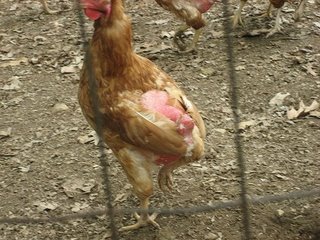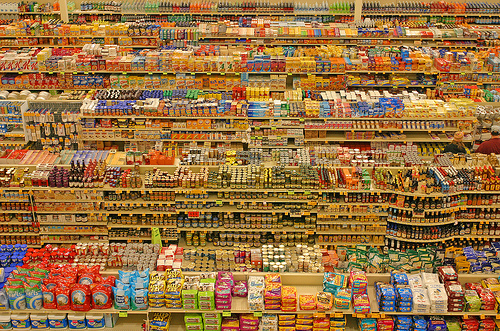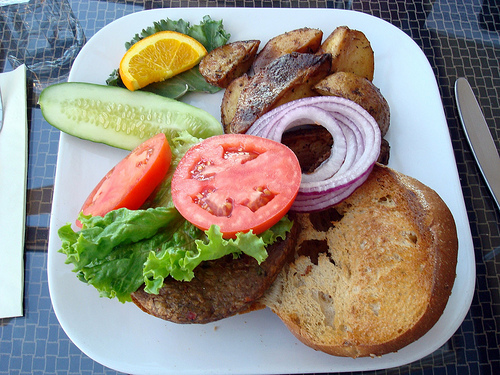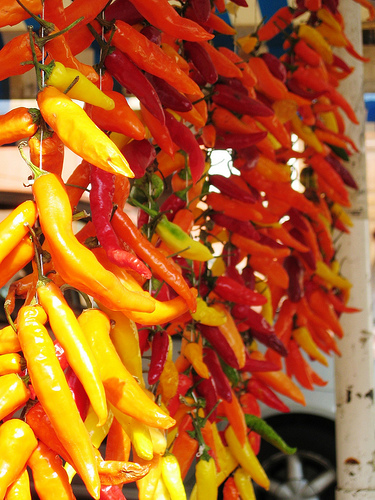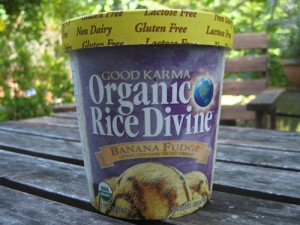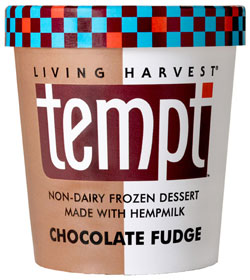Table of Contents
Gelatin is a commonly used ingredient found in numerous food and non-food products, known for its gelling and thickening properties. Despite gelatin’s versatility, is not considered vegan. Join us in exploring the reasons behind gelatin’s non-vegan status, the various controversies within the vegan community, different types of gelatin, and the availability of vegan-friendly alternatives!
Is Gelatin Vegan?
No, gelatin is not considered vegan. This is because it consists of processed collagen, which is extracted from the skin, bones, cartilage, ligaments, and tendons of dead animals, making it unsuitable for vegans and vegetarians.
This guide will provide an overview of what gelatin is, why it’s not vegan, and some vegan-friendly alternatives.
Types of Gelatin
Gelatin comes in two forms, sheet and powder. Both are sourced from the same animal collagen.
Non-Vegan Ingredients or Processes
Gelatin is a protein sourced from collagen. Collagen comes from the skin, bones, and connective tissues of dead animals, prominently cows and pigs.
Controversies or Gray Areas Within the Vegan Community
The vegan community holds varying views and debates about the use of gelatin overall. All vegans abstain from animal-derived gelatin. Some vegans may opt for certain types, like those obtained from marine sources such as seaweed or algae. These types do not involve animal suffering during production. However, there is still debate about the acceptability of these sources for health reasons.
Despite the vegan alternatives, gelatin is accepted as a non-vegan ingredient.
Vegan-Friendly Alternatives and Variations
People adhering to vegan and vegan-adjacent lifestyles can find many alternatives to gelatin. Agar-agar, or agar for short, is a popular substitute derived from seaweed, and provides a similar gelatinous texture, fitting for many recipes. Other options include carrageenan, pectin, and vegetable-based gelatin alternatives. These have similar texture to regular gelatin and can serve as excellent binding agents or thickeners in various vegan-friendly food products and recipes.
Store-Bought Alternatives
The good news is that most grocery and healthy food stores will keep plant-based gelling agents in stock. Here are some common vegan and kosher gelatin brands to be on the lookout for!
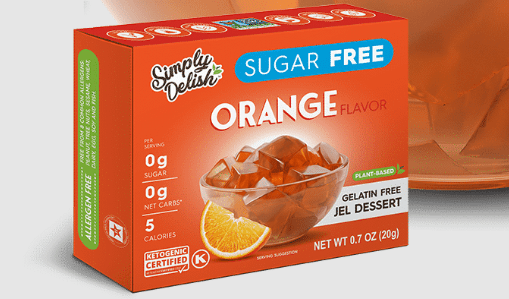
Simply Delish™
Simply Delish™ produces various flavors of vegan gelatin alternatives, including strawberry, raspberry, and orange. It is made from carrageenan and free from gelatin, artificial colors, and preservatives. It can be used to make jellies, desserts, and fruit snacks.
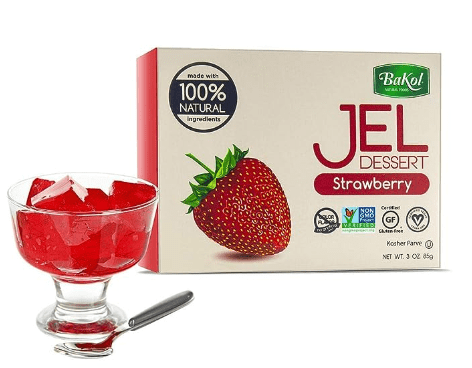
Bakol® Jel Dessert
Bakol® is a brand known for its vegan-friendly Jel desserts, which are perfect options for vegan jellies, custards, and other gelatin-based treats. These desserts are created with plant-based ingredients and do not contain gelatin, artificial colors, or preservatives, and most of their packaging is labeled “Kosher Parve.” You can find them in various flavors, such as cherry, raspberry, and lemon.
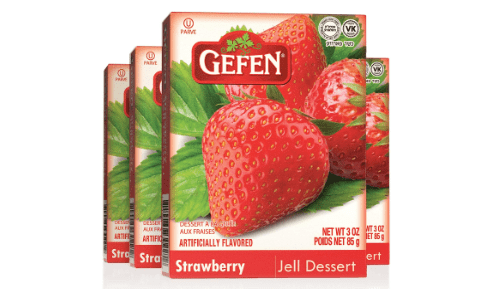
Gefen® Jell Dessert
Gefen® is another brand that offers vegan-friendly Jell desserts as alternatives to traditional gelatin-based desserts. Gefen® Jell desserts are made with plant-based ingredients and free from gelatin, artificial colors, and preservatives. They come in various flavors, such as strawberry, raspberry, and orange.
Tips for Identifying Vegan-Friendly Options
When looking to identify vegan-friendly options for gelatin, here are a few helpful tips to keep in mind.
Labels:
Look for vegan labels before purchasing. Many products now carry a vegan-friendly logo or label. These labels help indicate the product does not contain any animal-based ingredients and has not been tested on animals.
Check the ingredients list:
Make sure to carefully review the ingredients of the margarine packaging, ensuring the absence of animal-derived products such as gelatin or the colorant, cochineal.
Use store apps or websites:
Many grocery stores offer online platforms that enable product filtering based on dietary preferences, simplifying the process of locating vegan products before shopping.
If you use these tools effectively, you can find a vegan gelatin alternative that meets your preferences and dietary requirements.
Vegan Gelatin Alternatives
There are several options for gelatin ingredient swaps.
- Agar-agar: Can be used as a one-to-one replacement for gelatin in most recipes, providing a similar gelling effect.
- Pectin: Used frequently for fruit-based recipes, pectin is often derived from fruits like apples or citrus.
- Carrageenan: A common food additive made from red seaweed.
- Vegetable-based gelatin: Made from ingredients like konjac root or vegetable gums.
How to Use Vegan Alternatives in Recipes
When using vegan alternatives for gelatin in recipes, it’s important to follow specific instructions to achieve the desired results.
For agar-agar, which is a common gelatin substitute, you typically dissolve it in hot liquid (water, juice, etc.), bring it to a simmer while stirring, and then let it cool and set in the refrigerator. It’s important to note that agar-agar sets at a lower temperature compared to gelatin, so it may require less time to firm up.
When using pectin as a gelatin substitute, follow the instructions on the packaging, as the amount needed may vary depending on the recipe. Pectin needs to be mixed with sugar and boiling the mixture to activate its gelling properties.
Each vegan gelatin substitute may have slightly different usage instructions, so it’s advisable to refer to the specific product packaging or recipe guidelines for the best results.
How Gelatin Is Made
The production of gelatin begins with sourcing skin, bones, and connective tissues from cows or pigs. These animal parts are thoroughly cleaned to remove any impurities, then treated with acid or alkali to break down the collagen protein present in the tissues. The extracted collagen-rich solution is then heated and boiled to further break down the proteins and remove any remaining impurities. After boiling, the liquid undergoes a filtration process to remove solid particles, followed by concentration, clarification, and cooling.
Primary Ingredients
The primary ingredient in gelatin is collagen, a natural protein derived from animals.
Sourcing and Ethical Considerations
Environmental Impact
Gelatin production has a notable impact on the environment, as the process sources animal bones and parts, boosting demand for livestock farming. This form of agriculture requires significant land, water, and feed resources, which leads to deforestation, water pollution, and greenhouse gas emissions.
The gelatin processing stages, like boiling, filtration, and drying, are also energy-intensive, further amplifying the environmental footprint.
Labor Practices
Labor practices in gelatin production vary based on specific contexts and regions. Sometimes, workers in the meat industry process and collect animal by-products for gelatin production. Additionally, workers at processing facilities that produce gelatin engage in different stages of production, including cleaning, boiling, filtering, and packaging. Working conditions across the industry are not universal, resulting in concern about worker safety, fair wages, and access to proper protective equipment.
Upholding fair labor practices, workers’ rights, and safe working conditions throughout the gelatin supply chain is essential for maintaining ethical standards.
FAQ
What are the common uses of gelatin?
Gelatin sees wide usage in food items, including gummy bears, tacky fruit candies, ice cream, marshmallows, desserts, cakes, and gelatin-based salads or molds. Pharmaceuticals, photography, cosmetics, and certain industrial applications also incorporate gelatin.
How should gelatin be stored?
Gelatin should be stored at room temperature, away from direct sunlight and moisture. It is recommended to keep gelatin in an airtight container or resealable bag to prevent moisture absorption, which can affect its quality and ability to gel properly.
Are there health effects associated with consuming vegan alternatives to gelatin?
Generally, consuming vegan gelatin does not pose any specific health risks and can be considered a suitable option for those with dietary preferences or restrictions.


